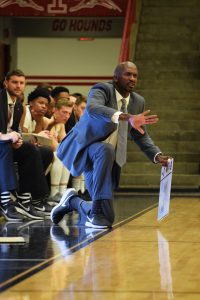The record held by second winningest coach and hall of fame member, Harry Good, was recently broken by Stan Gouard, head coach of men’s basketball. Beyond record breaks, Gouard surpassing Good in terms of wins has a symbolic significance for diversity at the University of Indianapolis.
During his time as the coach of various sports in Indianapolis, Good was well-known for his progressive views when it came to recruiting athletes of color to play on his teams, according to Professor of History and Faculty Athletics Representative Larry Sondhaus.

“He [Good] was historically significant for recruiting black athletes. From the beginning, there were non-white students here [at UIndy], but they were typically church connections,” Sondhaus said. “Back in the 20s and 30s, there was a color line even in the Big 10…There were great, great basketball players who IU [Indiana University] and Purdue [University] could not recruit, and he got them to come here. He [Good] recruited them.”
Good later left the university to coach at IU and eventually retired from the University of Nebraska after a long career in athletics. His legacy of inclusion, however, remained relevant when UIndy’s first African-American head coach, Gouard, surpassed him for a new school record.
Being African-American has not personally affected his experience as head coach, Gouard said, but he understands the need for diversity within UIndy athletics. While Gouard has noticed that he is the only African-American head coach in the league, he said it does not bother him because he has learned to interact with people of all backgrounds.
“Sometimes people look at it differently than I do. Everybody’s eyes are different. It’s not problematic in my eyes, it’s just the way it is and something we’ve got to deal with and make change,” Gouard said. “If you’re a guy who’s coaching and see it as problematic, then you have a right and can do something about it.”
Doing something about it is a priority for Vice President for Intercollegiate Athletics Sue Willey, who has a different perspective on the issue of diversity in athletics. Willey said she feels that it is important for every university to prioritize diverse coaching staffs so that athletes have role models to look up to.
“All of our student athletes should be able to see people who look like them, people who talk like them, because they are the students’ role models,” Willey said. “I personally get very frustrated, and feel badly for a lot of other teams, when I see a men’s basketball team where at least half the players are black and the whole coaching staff is white. What message are we sending?”
For Gouard, representation is not as much of a priority as relating to players. While his race has helped him connect with some players, Gouard said that he uses his ability to mingle with people from different backgrounds to communicate with each athlete regardless of their background.
“There’s been times when you had to relate to your players because of color, but at the same time I can relate to all my guys because I was in their shoes once,” Gouard said. “You look at guys, and not just the average American guys, everybody’s come from very different backgrounds. You’re talking middle class, high class, low class. So you’ve got to relate, and I’ve been around all types of people in my years as a person, as a player.”
Apart from their expertise about enthusiasm for athletics, relating to student athletes from various backgrounds is an important part of what coaches like Gouard contribute to athletics at UIndy. They serve as examples, Willey said, that players can look up to.
“Through much of the university’s history, athletics has been responsible for adding racial diversity to the student body. Dating back to when Harry Good recruited Dave DeJernett in 1930, men’s basketball has led the way,” Sondhaus said. “The tradition of providing opportunities to talented student-athletes from all backgrounds continues today under Coach Gouard.”





